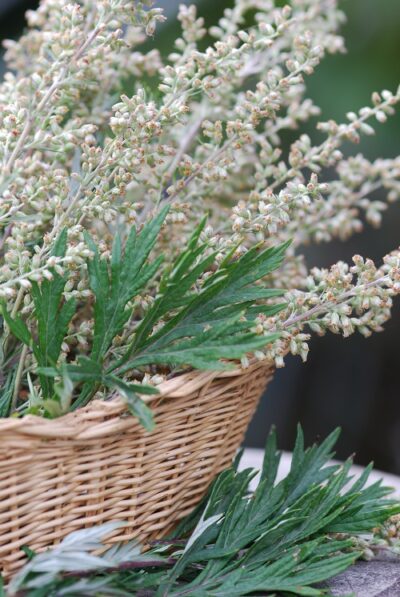Unlike an wormwood (Artemisia absinthium), an ingredient in the psychoactive alcoholic drink known as absinthe, Mugwort (Artemisia vulgaris), which has a tonic effect on consciousness, is not toxic, though the two plants are rather indistinguishable.
The leaves and roots contain volatile oil (linalool, eucalyptol, β-thujone, borneol, α- and β-pinene), lactones (vulgarin), flavonoids, coumarin derivatives, and triterpenes, which produce bitter tonic, stimulant, nervine tonic, and emmenagogue actions.
Mugwort can be used as a mild sedative and may be useful for calming nerves and easing depression and tension.
Used at nighttime whether by smoking or infusing in hot water (cover until drinking to avoid evaporation of volatile oil), this dreaming herb is known to help induce lucid dreaming and intensifying dreamscapes.
Effects
It is believed that an essential oil and toxin known as thujone found in the root and leaves of mugwort is responsible for the hallucinogenic properties of such Artemisia species as A. absinthium.
Mugwort may also contain a weak monoamine oxidase inhibitor (MAOI), which may contribute to its halluginogenic, dream-inducing, and anti-depressant effects.
Artemisia ludoviciana of North America is stimulating. A Himalayan species of mugwort is used to support meditation. Other species, such as Artemisia nilagirica, are smoked in Southeast Asia as a sedating hallucinogen.
As a muscle relaxant and analgesic, mugwort is generally regarded as a hypnotic, or a sleep herb. It is a mild sedative when taken near bedtime. It may also improve sleep quality and reduce tiredness the following day.
But it is also an oneirogen, or dream herb. Artemisia copa found in Northern Chile is said to induce dreams.
Mugwort as a Medicinal Herb
In Ayurveda, mugwort is known to effect the skin, blood, muscles, marrow, and nerves and the following bodily systems: circulatory, female reproductive, nervous, digestive, and respiratory.
The following conditions can be treated with mugwort: dysmenorrhea (menstrual cramps), menorrhagia (heavy periods), infertility, sciatica, convulsions, hysteria, epilepsy, depression, tension, mental exhaustion, insomnia, gout, rheumatism, and fungal infections.
It is also sometimes used as a preventive for miscarriage.
Externally, mugwort can be used as a wash for fungal and other skin infections, including vaginal yeast infections.
It is an
- nervine tonic
- bitter tonic
- carminative
- stimulant
- emmenagogue
- antispasmodic
- hemostatic
- diaphoretic
- anthelmintic
- antiseptic
As a bitter, mugwort may be used whenever digestive stimulation is needed.
Mugwort Dreams & Sleep Effects
Mugwort is most commonly used as incense for magic, spiritual purification, dispelling negative energies, treating possession, and protecting the home. A psychoactive incense is made from Artemisia mexicana.
To use mugwort as a dream potentiator, take it every night before going to bed.
To make a tea, pour 1 cup of boiling water over 1 to 2 teaspoons of dried herb and infuse for 10 to 15 minutes in a covered container.
It may take 2-4 weeks before the full effects are manifested. Mugwort is said to make dreams more vivid, to improve dream recall, and to induce lucid dreams. If you start experiencing nightmares, you should probably take a break.
One person shared that he prepares a mugwort elixir using fresh mugwort, brandy, and honey. He reported an experience which “was really intense and vivid I slipped right from yawning in my bed to lucid dreaming.” Currently, he is working on a dream potion with mugwort, blue lotus, and red clover.
Someone else reported that he likes to mix mugwort with valerian. He recommends drinking it as a tincture or tea after several hours of sleep, then going back to sleep.
I recommended burning some mugwort incense before attempting to perform an astral projection or WILD technique, especially if you need help with attaining a physical state of relaxation. Mugwort is also beneficial for improving the ability to remember your out-of-body experiences and lucid dreams.
To benefit from mugwort’s anti-depressant nervine properties, it is possible to extract the active ingredients, including thujone, in alcohol. Indeed, mugwort was sometimes used as a psychoactive additive in beer. You can also steep mugwort in any alcoholic beverage, or even in plain hot water. But cover your mugwort tea while it’s steeping to avoid loss of essential oils
Mugwort is also suitable for use as a tobacco substitute and in smoking blends. While being very low in thujone, its effects include an euphoric “high” which may resemble the effects of the THC in Cannabis, possibly making it a marijuana substitute.
The boiling point of thujone is 201°C (394°F), which suggests it may be possible to inhale it using a vaporizer.
Warning: Do not use this powerful herb during pregnancy or if you suffer from any medical conditions, including uterine infection or inflammation, kidney stones, and gastritis, without consulting with a physician first.
Note that mugwort may be allergenic to people sensitive to plants in the Asteraceae family.

Mugwort Dreams Experiences
People describe the effects of mugwort as being mild. Tranquility, relaxation, lightheadedness, euphoria, and sleepiness are often mentioned in reports.
However, when taken during the day, a mild stimulant effect may be noticed, perhaps explaining contrasting traditional uses of the plant that I mentioned above.
Some people report an increase in hypnagogic imagery and a dream-like state when taking mugwort before going to bed. Others report improved dream recall, such as in the following report:
Smoked some dried mugwort before going to sleep, was a pleasent smoke, no coughing. I was able to get to sleep easily, the mugwort didn’t have any waking effects for me. When I woke up the next morning, I remembered 4 dreams extremely vividly. As I woke up I didn’t remember anything initially, and was disappointed as I thought it didn’t work. But about 10 minutes later everything came to me. The details and pictures of these dreams were very clear and I still remember them 10 hours later.
As I wrote above, mugwort may help concentrate in meditation, but this effect occurs when you are not tired. When dreaming, this effect may manifest as a strengthened presence within the dream, which can increase the chances of becoming lucid. Indeed, people point this out, such as this person who reported:
I found that mugwort tea consumed before bed definitely affected my dreams in some instances. There was the sense that I was more present in my dreams, and that my dreams had the potential to be more meaningful…
An experienced mugwort user summarized the dream effects of the herb:
Generally I have seen the following types of changes to my dreams with the use of mugwort as described:
– Much easier to remember dreams.
– More conscious awareness during dreaming (trending towards lucid dreams).
– Much more “super-fine detail” in dreams – for instance, I sometimes find an ability in my mugwort-influenced dreams to “zoom in” on a particular visual detail to a great level of detail, or I’ll be able see the fine workings of some organism or machine in exquisite detail. A good analogy is viewing a mechanical watch’s gears from a couple feet away versus having a close-up view of those gears that encompasses your whole visual range.
– A pronounced increase in bizarre dream events/content.
Conclusion: Mugwort Dreams
Mugwort is an excellent yet mild sleep and dream herb with relaxing and anti-depressant properties.
Purchase some incense if you don’t like the tea and get into the habit of using it every night before bed for better sleep and dreams.
Drink mugwort tea during the day (perhaps with the addition of green tea) for support during meditation, WILD, and astral projection practice.


